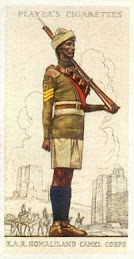Hunwick Note
Evanston, Illinois, USA, Feb. 25, 2006 (SL Times) – The note below was part of the round table discussion entitled “The Politics of Somaliland’s Self-Determination” that took place on Feb.18, 2006 at Northwestern University, Evanston, Illinois, USA. The Somaliland Times is pleased to share with its readers some of the insights of the participants. We are particularly pleased to know the role that professor Hunwick’s experiences in Somaliland had in stimulating his interest in Islamic and African studies. After all, despite his modesty, Dr Hunwick is the man who drew the attention of the world to the Timbuktu Manuscripts which laid to rest the notion that Africa had no written history.
My Experience of Somalia
By John Hunwick
Professor Emeritus,
Northwestern University
Although I have never done research on Somalia, part of that state was, nevertheless, the first African area that I visited, though regretfully, I have not yet returned there. In fact, some fifty years ago - before Somalia became a large independent state, I spent a year in British Somaliland, serving as a military officer of the local army, known as the "Somaliland Scouts". The British colonial area was to the north and west of the present independent Somalia, with a small French colonial area to its west, and to its east and extending down to Kenya was the Italian colony. British Somaliland also had, as its neighbor to the south of it, a part of Ethiopia, with occasional battles between nomads of both areas, which sectors of the "Somaliland Scouts" generally had to deal with and re-establish peace.
My first location was Hargeysa, the capital of British Somaliland, and the headquarters of the "Somaliland Scouts". I arrived there in September 1955, having sailed from England to Aden, and then flew over to Hargeysa. I was then sent to Burao, some 80 miles east of Hargeysa; and there I was given to learn about military vehicles including, for the first time, how to drive. Driving in British Somaliland was on desert-like tracks, except in Hargeysa (and partly in Burao), where there were regular British-style roads. After a month, or so, in Burao, I was then appointed to a regiment, and joined up with them in Ainabo to the south-east of Burao. Every regiment would change its location every six months, so before long I went back to Hargeysa with my military force, and ultimately to Adade before my military service - a total of two years - came close to an end, and I moved back to England - in August 1956.
My military service in British Somaliland was training of the soldiers of my regiment, and taking care of its vehicles (mainly small-ton trucks). However, I saw parts of the semi-desert country area, especially when my regiment was in an encampment near Adade. There were many various wild animals, including lions; and I had to take part in killing two of them: the first being a lion that had disturbed the evening practice of a group of soldiers of my regiment; and the other in help of some nomads whose sheep had been attacked - and some killed - by a lion.
British Somaliland was an attractive place for me. Many people - even in the army - spoke English to some extent, but I found it useful to be able to contact most people by speaking Somali. The Somali language had some influence of Arabic, since just about all Somalis were Muslims, and they claimed that they had moved into Somaliland many centuries ago from the Arabian Peninsula. I enjoyed working with them, and soon found their religious attitudes very attractive. Indeed, this convinced me to learn Arabic when I returned to England for university training, and with such knowledge, to learn more about Islam. Hence, I have continued to study Arabic and Islam in Africa - most especially related to West Africa, where I spent many first years of my academic career (in Nigeria and Ghana).Now, for five years, I have been running the "Institute for the Study of Islamic Thought in Africa (ISITA)" through our Program of African Studies.
Source: Somaliland Times
http://www.somalilandtimes.net/sl/2005/214/30.shtml
skip to main |
skip to sidebar
This blog would be used to publish British Somaliland History

.png)



